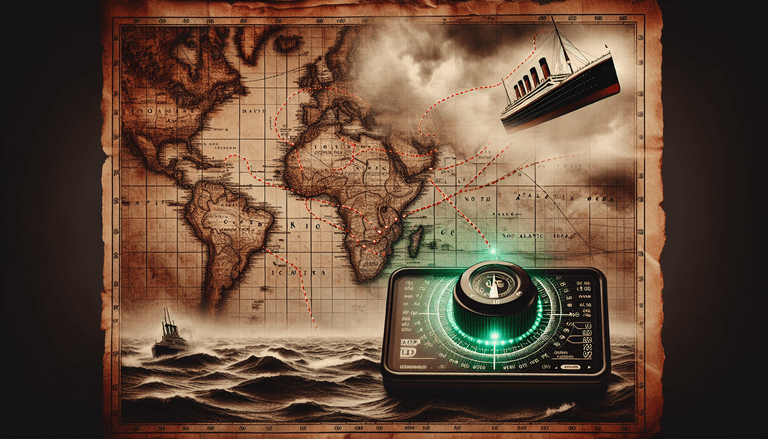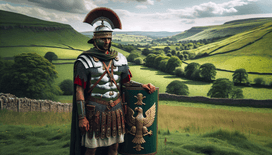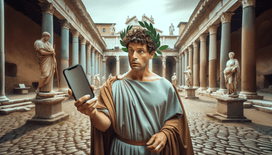Ah, the Titanic – the ship of dreams, a floating palace, the unsinkable behemoth that sank on her maiden voyage. The irony is a hefty iceberg looming in our collective memory, but what if Captain Smith and his crew had been equipped with GPS? Would it have been just another uneventful maritime success story, relegated to a dusty page of the ship logs, rather than the object of countless films and romanticised narratives?
GPS: Globally Preventing Sinking?
Picture the scene: the year is 1912, and the Titanic, resplendent in all her glory, is about to set sail from Southampton. Families bid each other farewell, oblivious to the brewing seafaring calamity. Little do they know, a digital guardian angel is about to take helm – the Global Positioning System (GPS). With GPS deftly residing on the bridge, alongside compasses and sextants, the confidence of the officers grows tremendously. "What's this, then?" asks the unsuspecting Captain Smith, peering curiously at the blinking screen. The crew, perhaps bemused by this modern maritime oracle, quickly learn to navigate by satellite rather than the stars.
"Looks like we're in for smooth sailing, Captain," says Officer Lightoller as he gives a slight tap to the glowing screen, now depicting the vessel's precise location. "We'll know where every iceberg is lurking!"
Iceberg? What Iceberg?
Thanks to the marvels of satellite technology, the Titanic's voyage would have been monitored with pinpoint accuracy. The polished gears of this grand narrative begin to shift, sidestepping the infamous iceberg. An icy disaster reduced to nothing more than a minor inconvenience, GPS renders the Atlantic a vast playground of possibilities rather than a frigid graveyard.
One evening, as the sky carpets itself in stars, a warning emerges on the screen, a cluster of icebergs ahead! Would they be as ill-boding as moles on a nose? "Easy peasy," quips the first mate with a smirk, "We'll simply chart a course around them."
The Titanic, it turns out, wasn’t playing chicken with the iceberg this time. Passengers remain oblivious to their near-encounter with history, gleefully sipping their brandy and debating the latest Edwardian fashion trends.
Passengers Posting from RMS Titanic
If GPS is the leading actor in our historical rewrite, let's not forget the supporting cast, smartphones in the hands of every passenger. Imagine the promenade deck filled with Edwardian selfie-stickers, their boots tapping the Morse Code of newfangled social media comments. "Bit chilly today, LOL #icebergavoided," tweets a young socialite, followed by impeccable gifs and witty jibes. The combination of instant connectivity and avoidance of calamity turns the voyage into a glamorous gallivant across the Atlantic.
Meanwhile, an intrepid investigative journalist with an affection for puns sends a blog post: "Titanic Hits the High Seas–Survives!" It goes viral, a sensation that even the ship’s state-of-the-art wireless operator couldn’t have anticipated.
Carnival at the Customs House
Days slide by and finally, New York City looms ahead. The GPS having expertly guided the Titanic, uncloaked every iceberg hiding in its path like shy phantoms, steers the mighty vessel into harbour. As the ship docks at Pier 59, confetti rains down from the mast, and New Yorkers line the streets for a spontaneous parade. "It was nothing," announces Captain Smith to a gathered crowd, mightily unrecognisable without his GPS sidekick. "Barely a scratch on 'er!" The Titanic easily fills her legendary destiny in the public's imagination as the epitome of safe, luxurious, transatlantic travel, the zeppelin of the sea we whisper about at garden parties.
The Legend without the Lament
So, what might our world look like today? Without tragedy, there's no grand monument in Belfast, no stark museum exhibits or fleeting Jack and Rose silhouetted in our hearts. The great cinematic sagas might have been told by huddles of starlit Edwardians spouting tales of reliable engines rather than lost love. With GPS, the Titanic becomes a different kind of legend, a vessel unurged by drama. While 'Unsinkable' Molly Brown still makes a splash, it’s one of luxurious travel rather than desperation-winning the race against time or tide.
Ultimately, it seems our Titanic becomes a tale of triumph rather than tragedy, a lesson in preparation and prevention, steered by unseen signals from the sky. It’s a comforting bedtime story with a glass of port and zero worries about unscheduled iceberg stops.







